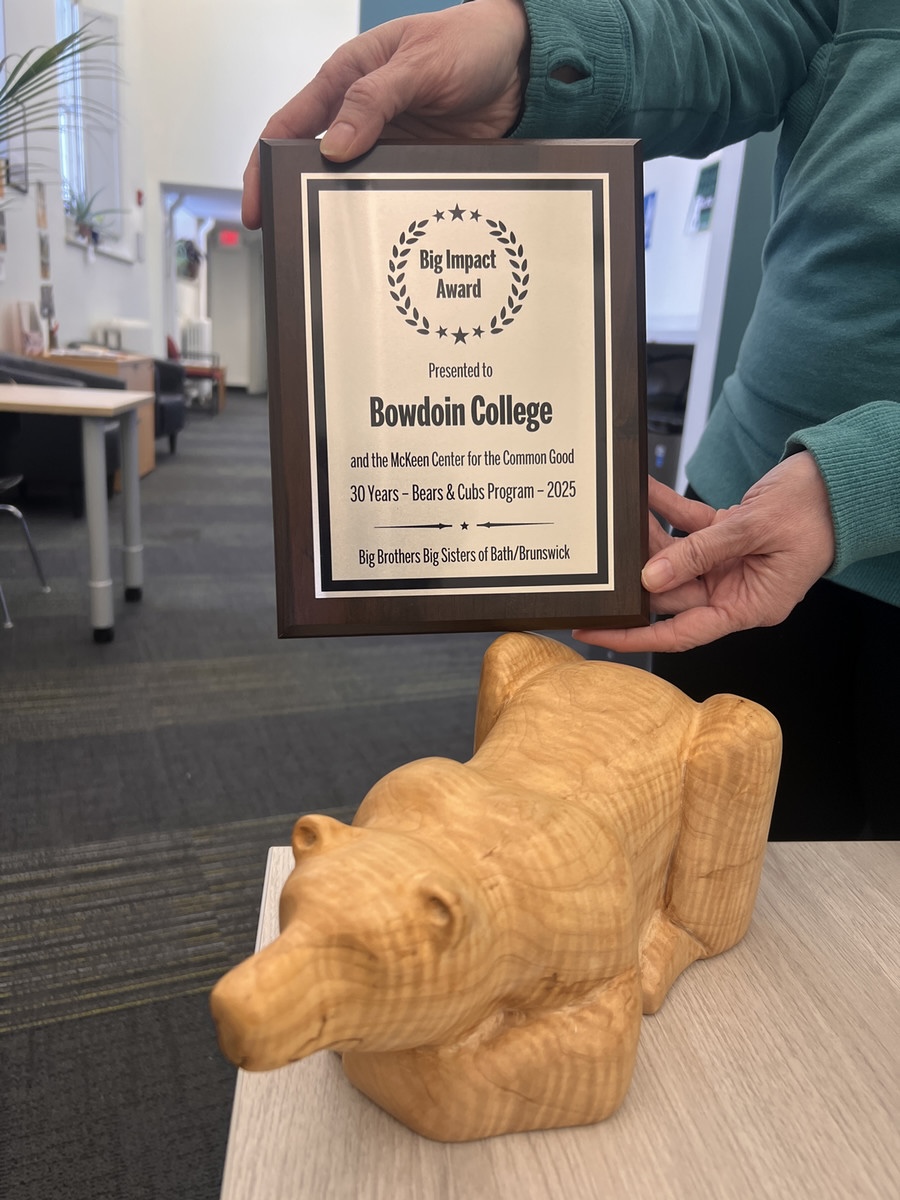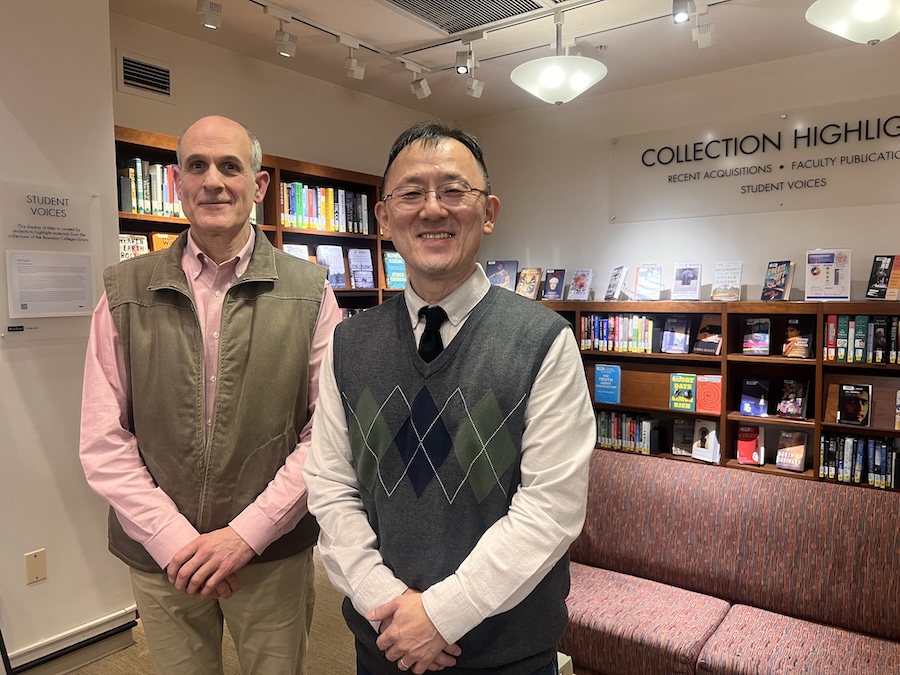Students Tackle Poverty, Human Trafficking, Other Issues in Alternative Winter Break
By Tom Porter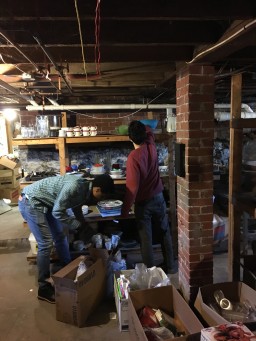
Seventeen Bowdoin students were back in the neighborhood a week before most of their colleagues this semester to take part in an “intensive public service experience.”
Alternative Winter Break is one of two annual alternative breaks — the other is in the spring.
The aim of the program, which is coordinated by the McKeen Center for the Common Good, is to expose students to communities with which they would otherwise likely have little contact. The aim? To increase their understanding of significant social and environmental problems.
This year’s Alternative Winter Break program was split into two trips, both centered in southern Maine. One cohort examined the issues of human trafficking and poverty, while the other spent the week learning about immigrant and refugee education.
“At Bowdoin we learn a lot,” says Jesse Ortiz ’16, one the student leaders of the project.
“But Alternative Winter Breaks are unique because they allow us to really see the kinds of work we can be doing outside of school. It makes the ideas that we talk about at Bowdoin concrete and not so abstract.”
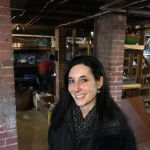
Ortiz is with the group examining human trafficking and poverty. It’s the Wednesday before classes begin and he is with six other students at the Tedford Adult Emergency Shelter in Brunswick. They’re in the basement, helping sort through a pile of donated goods.
“It’s great to have the students helping out,” says Jennifer Iacovelli, director of development at the Tedford shelter.
“We don’t have a very big staff and often we can’t spare the time to do things like sort through all the donated toiletries and other items we get. Our basement if full of them!”
The week is split between learning and helping. Today they’re helping, but the trip also involves visiting social service agencies and talking to victims of sexual violence.

“On Monday,” says Ortiz, “we visited the St. Andre home for homeless pregnant women. They also run a safe house for women who have been trafficked.”
Also helping out in the basement is Marcus Wright ’17, from North Carolina.
“Issues like human trafficking and poverty are things that you feel some distance from,” he says, “especially if you go to a college.”
Nevertheless, says Wright, these are problems that are on our doorstep.
For example, 2014 saw a record high in the number of people forced into prostitution or unpaid labor in the state, while Maine has the highest rate of food insecurity in New England.
Wright says taking part in the project is “definitely influencing the way I think about the world and broadening my perspective on how I can be helpful to the community wherever I am once I graduate.”
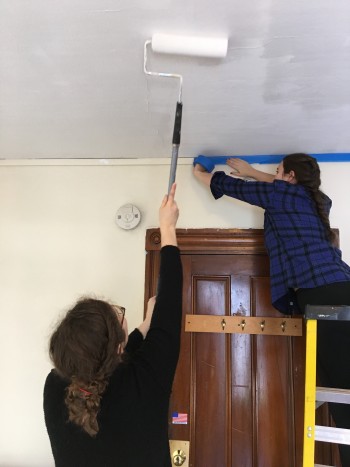
Upstairs on the second floor, paint roller in hand, Julianna Burke ’18 helps decorate one of the shelter’s four bedrooms.
Although being from South Berwick, Maine, she admits to being unaware of the extent to which human trafficking is happening in her home state.
She says “it’s important to help in whatever way we can and become more literate as citizens on these issues.”
Also on paint-rolling duty is fellow sophomore Rowan Staley ’18, a native of State College, Pennsylvania.
She decided to enroll in the Alternative Winter Break program because she realized she knew “absolutely nothing about Maine outside of Bowdoin, and I’ve learned a ton. I’ve learned about policy issues that I was not aware of before: the way Maine deals with poverty and homelessness.”
Student leader Elina Zhang ’16 is with the other AWB group. She’s one of ten students spending the week immersed in the issue of immigrant and refugee education.
This involves volunteering with organizations in Portland that serve those communities.
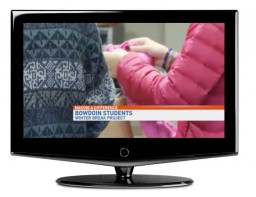
WGME report on Alternative Winter Break
Zhang has previously led a spring break program on the same issue in Atlanta, and is excited to revisit the issue here in Maine.
“I believe attending these trips allows me to witness what I have learned in my Sociology and Anthropology classes,” says Zhang.
“That is, the challenges of becoming integrated into the American system of education.”
While continuing to study the issue from the classroom level, she finds the Alternative Break program enables her to personalize the problem.
“When I meet people who are struggling to find the education they need in the U.S., I feel like the stakes are higher and I am able to invest more emotionally into the issues that these communities face.”

